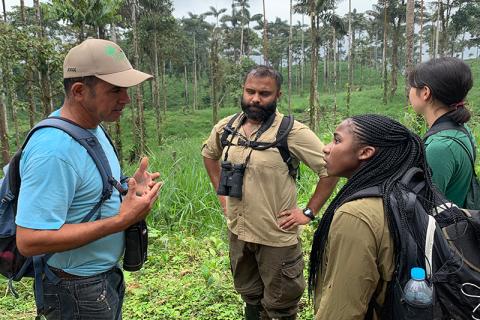Project Ecuador saves species, opens world to Tulane students
Jordan Karubian has been conducting tropical research in northwest Ecuador since 2003, long before he joined the faculty of the Department of Ecology and Evolutionary Biology at Tulane University in 2010.
Having lived in Ecuador for six years, he knew the area to be a conservation hotspot for biodiversity, with a “mind-bending” number of species — birds, primates and other organisms. Unfortunately, many are endangered or critically endangered due to deforestation.
“I decided to work there because it was the most compelling place to have an impact on conservation biodiversity,” Karubian said. “But it was an area that had been really neglected.”
Neglected is not a word that he uses anymore. In fact, as an associate professor in the Tulane School of Science and Engineering, Karubian has taken his work in the Chocó rainforest to a whole new level. Through community-engaged research, his Project Ecuador is helping change lives and save endangered species. The initiative has garnered over $1 million in funding and provided hands-on research opportunities for Tulane undergraduate and graduate students.
These efforts have enabled Tulane and its partner FCAT, an Ecuadorian conservation group, to purchase 320 acres of rainforest habitat and build a field station with capacity for 45 visitors. In August, they inaugurated the station by bringing a group of 15 Tulane undergraduates to the site for a two-week immersive course in Tropical Field Biology and Conservation.
Administered by the Center for Public Service, the course (EBIO 3780) will be offered again in May 2020 and represents an outstanding opportunity for curious students to get a first-hand experience in tropical fieldwork. Kathleen Sway is one of nearly 100 undergraduates who have participated in the program.
"My experience in Ecuador put me out of my comfort zone and exposed me to an amazing community of biologists and local people while developing my abilities in research design and data collection” Sway said. “Within just two weeks, I learned an incredible amount about tropical biology, conservation and community outreach through hands-on projects and trips out into the surrounding towns.”
Recently, Karubian received a $50,000 award from the Disney Conservation Fund as part of a $6 million initiative aimed at studying wildlife, protecting habitats and developing community conservation and education programs in critical ecosystems around the world.
He said that award will go towards continuing community-engaged research on focal species and expanding local education and training activities for residents and the Ministry of the Environment. Additionally, he is looking to develop a 3,000-acre corridor that connects the largest remaining patch of forest in the region with a key rainforest lake that has the potential to anchor a strong local ecotourism.
One of the most critical issues is the deforestation of the area by small-scale farmers who because of a lack of viable alternatives are cutting down what remains of the rainforest to grow crops. That’s where Project Ecuador comes in, empowering local residents to conserve their rainforests and use them to their advantage.
“Our goal is to develop a nature preserve that will maintain environmental quality but also work hand in hand with local residents to help them benefit economically, though touring, lodging and handicrafts,” Karubian said.
He hopes to attract interest from other parts of Tulane, including public health, liberal arts and architecture. “I want to promote interest and involvement from across the whole university,” he said. “This is a real opportunity for interdisciplinary education and staying on the forefront of innovative education.”

